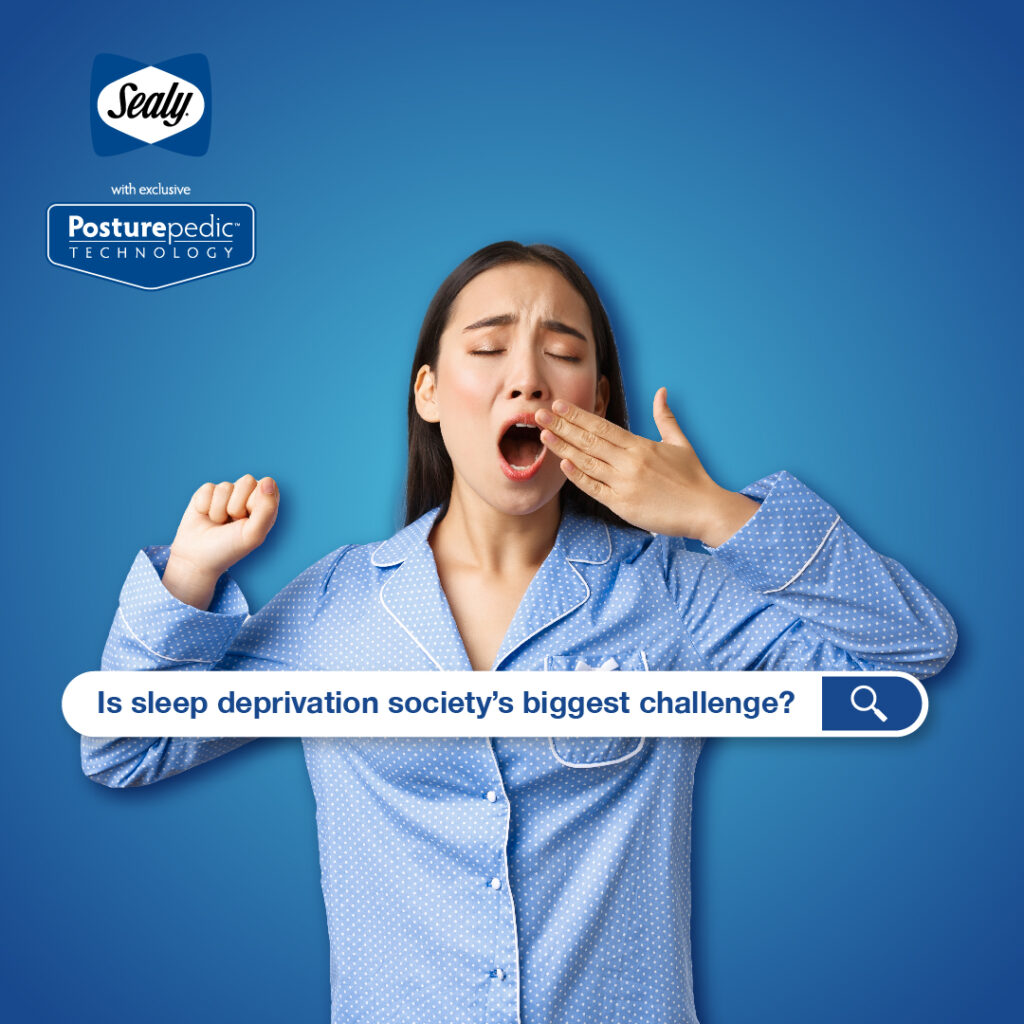Sleep deprivation is one of the biggest challenges faced by emerging economies around the world. When we say, ‘Sleep-deprived South Africans are currently costing the economy billions’ – this is no joke. [1] South Africans get less sleep than any other country in the world.
The average South African sleeps between 6.25 and 6.5 hours per night on average, while the recommended amount is between 7 and 9 hours. [2] With such a significant sleep deficit, it’s no wonder that sleep deprivation is a growing problem.
Insufficient sleep impacts an individual’s health, life, and productivity. It can lead to various physical and mental health problems impacting your daily life. This lack of productivity also impacts the economy.
In this blog, we’ll explore the results of insufficient sleep on health, the impact of sleep deprivation on society, and the consequences thereof.
The impact of insufficient sleep on health
Sleep is crucial for good physical and mental health and overall quality of life. The effects of short-term sleep deprivation can lead to an increased risk of accidents, errors, and mood changes that can affect personal relationships.
However, long-term sleep deprivation can contribute to a wide range of health problems, including:
- Cardiovascular disease
Research shows a link between sleep deprivation and cardiovascular diseases such as high blood pressure, heart attack, stroke, and coronary heart disease. [3]
- Obesity
Inadequate sleep may lead to overeating, especially high-calorie and high-carbohydrate foods, contributing to obesity and weight management issues.
- Diabetes
Inadequate sleep has been linked to the body’s impaired ability to regulate blood sugar levels, increasing the risk of developing metabolic disorders such as diabetes. [4]
- Hormonal abnormalities
Sleep is crucial in regulating the body’s hormone levels. Chronic sleep deprivation can lead to hormonal imbalances, potentially increasing susceptibility to various hormonal problems.
- Immunodeficiency
Lack of sleep has been associated with a weakened immune system, decreasing the body’s ability to fight infections and illnesses. [5]
- Brain function
Sleep deprivation can significantly impact cognitive function. The prefrontal cortex, responsible for reasoning and decision-making, and the amygdala, which processes emotions, can both be affected by sleep deprivation. It can also lead to mental health problems such as depression and anxiety.
Why is sleep deprivation a huge problem for society?
Risk of accidents
One major concern with sleep deprivation is the increased risk of accidents. Drowsy driving, for instance, can be just as dangerous as driving under the influence of alcohol. If you’re sleep-deprived, your reaction time to unexpected incidents is slowed down, and you’re more likely to make mistakes, which can be life-threatening.
Poor decision making
Sleep deprivation may also make decision-making, concentrating, reasoning, and remembering important details harder. [6] This can be particularly challenging if you work in a high-stress environment that requires you to be sharp and alert.
Relationship problems
You’re likelier to feel irritable, moody, and anxious when you don’t sleep enough. This can lead to strained relationships with family, friends, and colleagues.
The bottom line
If you are experiencing sleep deprivation, you may need to look at making minor or significant life changes, especially when it comes to stress levels. Depending on the challenges you face, you might want to consult a professional for medical advice.
An uncomfortable mattress could negatively impact your sleep, so it’s important to assess whether your body is adequately supported and if your bones are properly aligned while you’re sleeping. If your mattress is uncomfortable, you will have difficulty falling asleep and staying asleep and when you wake up, you might experience pain and body aches.
It’s not uncommon for people to sleep on a mattress past its expiration date or to have a low-quality mattress to begin with.
Invest in a mattress that is designed to support your sleep
Through constant research and development, and collaboration and studies with orthopaedic surgeons all over the world, the Sealy team has established the best ‘criteria’ for optimal sleep. Building upon the recommendations of these world class orthopaedic surgeons, Sealy constructs mattresses with unique spring systems for body support, topped with foam and comfort layers with pressure relieving properties – meaning the body is in its natural position to fully relieve muscular tension. This is known today as Sealy’s exclusive Posturepedic Technology™, which targets the heaviest part of your body, with reinforced support where you need it most. Only Sealy with exclusive Posturepedic Technology™ mattresses give you deep-down push back support for exceptional all-over comfort.
Sealy Posturepedic Technology™ supports your sleep by providing:
- Pressure relieving comfort for undisturbed sleep: from Ultra-Plush to Extra-Firm, built with premium materials.
- The support you need: deep-down orthopedically correct push-back spring system, surrounded with a superior edge support system.
- A system where everything works together to give you the same great comfort and support for a long time: extra durability that repays your investment day after day.
The Sealy Posturepedic range features unique patented spring systems and high-quality luxury layers and fillings to provide a healthy night’s sleep. Click here to find out more about the Sealy Posturepedic range.
References
- News24, N. (2019). Sleep-deprived South Africans cost the economy billions. Business. Retrieved April 25, 2023, from https://www.news24.com/fin24/economy/sleep-deprived-south-africans-cost-the-economy-billions-20190225
- Smith, R. (2022). How much sleep are South Africans actually getting? KFM. Retrieved April 25, 2023, from https://kfm.co.za/articles/2022/03/09/how-much-sleep-are-south-africans-actually-getting
- Grandner, M. A., Alfonso-Miller, P., Fernandez-Mendoza, J., Shetty, S., Shenoy, S., & Combs, D. (2016). Sleep: important considerations for the prevention of cardiovascular disease. Current opinion in cardiology, 31(5), 551–565.
https://journals.lww.com/co-cardiology/Abstract/2016/09000/Sleep__important_considerations_for_the_prevention.12.aspx - TW, K. (2015). The impact of sleep and circadian disturbance on hormones and metabolism. International journal of endocrinology. Retrieved April 25, 2023, from https://pubmed.ncbi.nlm.nih.gov/25861266/
- L, B. (2011). Sleep and immune function. Pflugers Archiv : European journal of physiology. Retrieved April 25, 2023, from https://pubmed.ncbi.nlm.nih.gov/22071480/
- GR, P. (2012). Losing the struggle to stay awake: Divergent thalamic and cortical activity during microsleeps. Human brain mapping. Retrieved April 25, 2023, from https://pubmed.ncbi.nlm.nih.gov/23008180/






